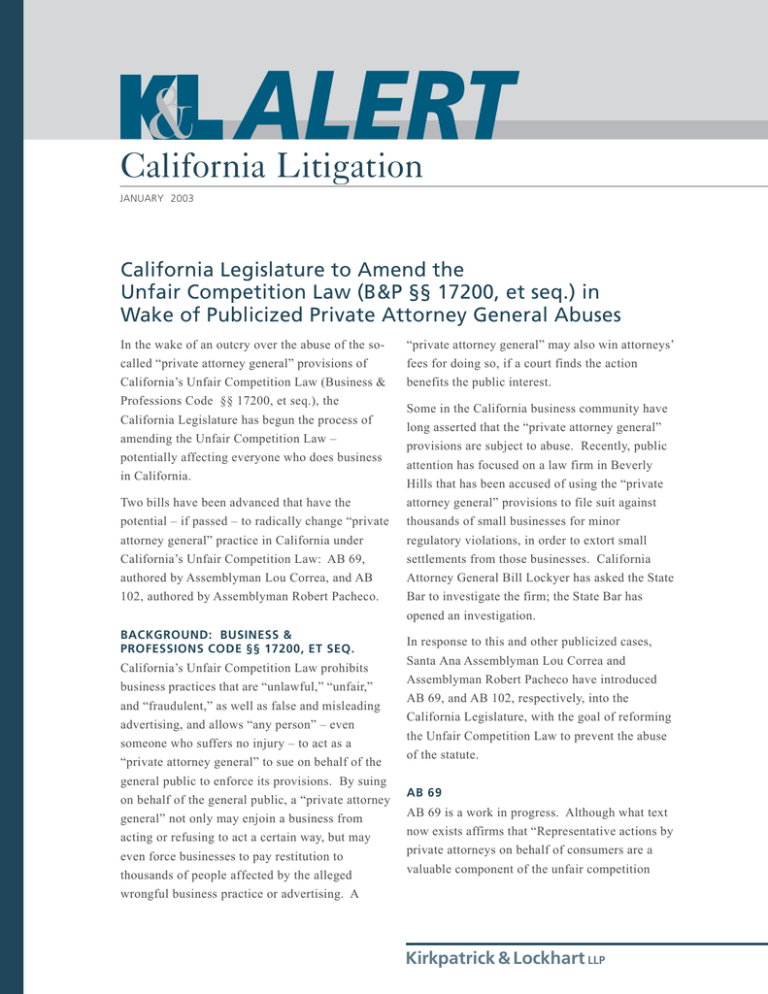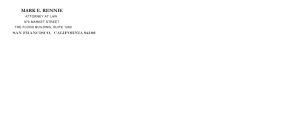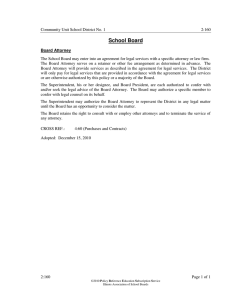
California Litigation
JANUARY 2003
California Legislature to Amend the
Unfair Competition Law (B&P §§ 17200, et seq.) in
Wake of Publicized Private Attorney General Abuses
In the wake of an outcry over the abuse of the socalled “private attorney general” provisions of
California’s Unfair Competition Law (Business &
Professions Code §§ 17200, et seq.), the
California Legislature has begun the process of
amending the Unfair Competition Law –
potentially affecting everyone who does business
in California.
Two bills have been advanced that have the
potential – if passed – to radically change “private
attorney general” practice in California under
California’s Unfair Competition Law: AB 69,
authored by Assemblyman Lou Correa, and AB
102, authored by Assemblyman Robert Pacheco.
BACKGROUND: BUSINESS &
PROFESSIONS CODE §§ 17200, ET SEQ.
California’s Unfair Competition Law prohibits
business practices that are “unlawful,” “unfair,”
and “fraudulent,” as well as false and misleading
advertising, and allows “any person” – even
someone who suffers no injury – to act as a
“private attorney general” to sue on behalf of the
general public to enforce its provisions. By suing
on behalf of the general public, a “private attorney
general” not only may enjoin a business from
acting or refusing to act a certain way, but may
even force businesses to pay restitution to
thousands of people affected by the alleged
wrongful business practice or advertising. A
“private attorney general” may also win attorneys’
fees for doing so, if a court finds the action
benefits the public interest.
Some in the California business community have
long asserted that the “private attorney general”
provisions are subject to abuse. Recently, public
attention has focused on a law firm in Beverly
Hills that has been accused of using the “private
attorney general” provisions to file suit against
thousands of small businesses for minor
regulatory violations, in order to extort small
settlements from those businesses. California
Attorney General Bill Lockyer has asked the State
Bar to investigate the firm; the State Bar has
opened an investigation.
In response to this and other publicized cases,
Santa Ana Assemblyman Lou Correa and
Assemblyman Robert Pacheco have introduced
AB 69, and AB 102, respectively, into the
California Legislature, with the goal of reforming
the Unfair Competition Law to prevent the abuse
of the statute.
AB 69
AB 69 is a work in progress. Although what text
now exists affirms that “Representative actions by
private attorneys on behalf of consumers are a
valuable component of the unfair competition
Kirkpatrick & Lockhart LLP
law,” the existing text also provides:
n
n
“Any improper or unethical use of the unfair
competition law damages the legitimacy and
undermines the original intent of that law.
These abuses also hamper the ability of
legitimate businesses to operate efficiently and
provide the jobs, goods, and services needed by
the consumers of this state.”
“Law-abiding business owners of California
have a right to expect reasonable protection
from unlawful, unethical, repetitive, or
disproportionate lawsuits or demands when the
public good has not been endangered.”
The “substance” of the legislation has not yet been
authored, but is currently underway. Ideas that
have been advanced include restricting the award
of attorneys fees, and providing protection for
businesses against multiple and successive
lawsuits.
Assemblyman Correa held a fact-finding hearing
in his Orange County district on January 10, 2003.
Participants included local businesses as well as
plaintiffs’ and defense attorneys who practice in
this area of law.
AB 102
More far-reaching changes are contemplated by
Assemblyman Pacheco’s AB 102, which adds a
proposed Section 17300, 17301, 17302, and
17303 to the Unfair Competition Law, under a
chapter titled “Representative Civil Actions By
Private Parties.”
Proposed Section 17300 would require a “private
attorney general”:
2
n
to have suffered a “distinct and palpable injury”
as a result of the challenged practices;
n
to demonstrate that he or she is an adequate
representative, has retained an attorney who
will adequately represent the interests of the
general public, and has claims typical of the
general public;
n
to give notice of intent to sue 90 days before
commencing suit, with the notice describing the
challenged practices;
n
to demonstrate that no public law enforcement
official has commenced a similar action against
the same defendant; and
n
to demonstrate that no other private plaintiff
has commenced a similar representative action
against the same defendant.
This section would enact major changes in
“private attorney general” practice. Specifically, it
would reverse existing precedent allowing
someone who has not been injured to serve as a
“private attorney general.” Moreover, it would
prevent multiple lawsuits against the same
defendant brought by different plaintiffs’
attorneys, and prevent plaintiffs’ attorneys from
“piggybacking” on the efforts of the attorney
general to enforce the Unfair Competition Law.
Proposed Section 17301 would require the court
to determine “as soon as practicable . . . whether
the action may be maintained.” This section
would give defendants another chance for an early
dismissal of a “private attorney general” lawsuit
that does not now exist. Under current practice, if
a defendant loses any one of several types of
motions to dismiss the case in its early stages, the
next chance for the defendant to knock the suit out
is on a summary judgment motion. A defendant
can expend significant resources on discovery
before then, and summary judgment motions
themselves tend to be expensive and difficult to
win.
Proposed Section 17302 would enact
unprecedented restrictions on discovery in
“private attorney general” actions. For example:
n
Discovery would be limited to matters
“relevant” to the unlawful, unfair, or fraudulent
acts specifically alleged in the complaint.
In contrast, the general civil discovery statutes
allow for much broader discovery.
KIRKPATRICK & LOCKHART LLP CALIFORNIA LITIGATION UPDATE
n
Before engaging in discovery, the plaintiff’s
attorney would have to present a declaration
certifying that (a) the discovery is not being
presented for any improper purpose (b) it does
not constitute an invasion of privacy of
nonparties; (c) it is related to the “specific,
nonconclusory factual allegations set forth in
the complaint that establish cognizable injury
to the plaintiff or others similarly situated”; (d)
the likely benefit of the proposed discovery
outweighs its burden or expense; and (e) it will
not result in annoyance, oppression,
harassment, etc.
There is no similar “certification” requirement
under the general civil discovery statutes.
n
The court may for good cause limit the number
of depositions, requests for admissions, and
interrogatories, and may limit the length of
depositions.
This may not represent too much of a change from
prior practice. These kinds of limits would be
available to a defendant who moved for a
protective order, and who could demonstrate
“good cause.”
n
Court approval is required to propound
discovery on nonparties, and the court must
find (a) the records or information sought are
relevant; (b) the burden of producing the
records or information is outweighed by the
need for the records or information; and (c) the
infringement on the nonparties’ privacy is
outweighed by the need for the records or
information.
SEPTEMBER 2002
The idea of obtaining court approval prior to
subpoenaing the documents, or engaging in other
discovery of a person who is not a party to the
litigation is simply unprecedented.
Proposed Section 17303 would allow the court to
consider “mitigating actions taken by the
defendant before the end of the 90-day period
described above that correct the act of unfair
competition.” The mitigating actions the court
may consider include a certified letter provided to
the plaintiff by the defendant documenting, under
penalty of perjury, that the act has been corrected.
Under current practice, the effect of similar
mitigating circumstances is not so clearly defined.
CONCLUSION
Clearly, the amendment of the Unfair Competition
Law provides California businesses and those
doing business in California with an excellent
chance to shape the future of this important statute
in ways to benefit the business climate in the state.
Because a significant amendment of the Unfair
Competition Law has the potential to significantly
affect so many of our clients, we will issue
periodic Alerts as new developments occur in this
important area of law.
MATTHEW G BALL
mball@kl.com
415.249.1014
Kirkpatrick & Lockhart LLP
If you would like to discuss any of these issues in greater detail, please
contact any one of the following K&L California Litigation Group
lawyers:
Los Angeles
Robert Feyder
Michael Mallow
Tom Petrides
David Schack
Ron Stevens
Paul Sweeney
Fred Ufkes
San Francisco Jon Cohen
Ed Sangster
Addresses
310.552.5023
310.552.5038
310.552.5077
310.552.5061
310.552.5000
310.552.5055
310.552.5079
rfeyder@kl.com
mmallow@kl.com
tpetrides@kl.com
dschack@kl.com
rstevens@kl.com
psweeney@kl.com
fufkes@kl.com
415.249.1001
415.249.1028
jcohen@kl.com
esangster@kl.com
10100 Santa Monica Boulevard, Seventh Floor
Los Angeles, California 90067
Four Embarcadero Center, 10th Floor
San Francisco, California 94111
®
Kirkpatrick & Lockhart LLP
Challenge us. ®
www.kl.com
BOSTON
n
DALLAS
n
HARRISBURG
n
LOS ANGELES
n
MIAMI
n
NEWARK
n
NEW YORK
n
PITTSBURGH
n
SAN FRANCISCO
n
WASHINGTON
.........................................................................................................................................................
This bulletin is for informational purposes and does not contain or convey legal advice. The information herein
should not be used or relied upon in regard to any particular facts or circumstances without first consulting a lawyer.
© 2003 KIRKPATRICK & LOCKHART LLP.
ALL RIGHTS RESERVED.





